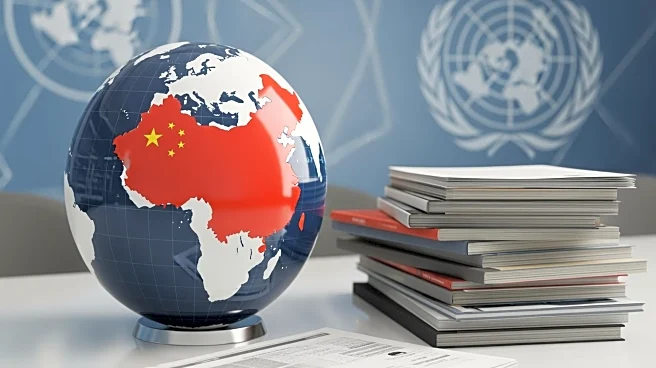What's Happening?
China has signed an expanded version of a free trade agreement with the Association of Southeast Asian Nations (ASEAN), known as the ASEAN-China Free Trade Area 3.0. This development comes as both China and ASEAN face
increased protectionism from the United States. The agreement was signed during the ASEAN summit in Malaysia, with Chinese Premier Li Qiang and Malaysian Prime Minister Anwar Ibrahim in attendance. The upgraded agreement aims to enhance economic ties by covering new areas such as digital trade, the green economy, and sustainability. It also seeks to support small and medium-sized enterprises, which constitute a significant portion of ASEAN businesses. The agreement is expected to lower tariffs, boost service flows, and increase investment, covering a market of over 2 billion people.
Why It's Important?
The expanded free trade agreement between China and ASEAN is significant as it represents a strategic move to counteract U.S. protectionism and strengthen regional economic ties. By focusing on areas like digital trade and sustainability, the agreement aligns with global economic trends and addresses modern challenges. This development could potentially shift economic power dynamics, as non-U.S. countries are increasingly collaborating to enhance trade relationships. The agreement is likely to benefit both China and ASEAN by improving supply chains and promoting sustainable practices. It also highlights the ongoing recoupling with the U.S., as both China and the U.S. are working towards a trade deal, which could impact global economic growth.
What's Next?
The ASEAN-China Free Trade Area 3.0 is expected to broaden regional integration and make trade benefits more accessible. As the agreement covers new areas, it may lead to increased market entry for smaller players and streamline non-tariff procedures. The focus on digital trade and the green economy could drive innovation and sustainability in the region. Additionally, President Trump is set to meet with Chinese leader Xi Jinping in South Korea, where they aim to finalize a U.S.-China trade deal. This meeting could further influence global economic relations and impact the ongoing trade conflict between the two largest economies.
Beyond the Headlines
The expanded trade agreement reflects a broader trend of countries seeking to strengthen economic ties outside of U.S. influence. This shift could lead to long-term changes in global trade patterns and economic alliances. The focus on sustainability and digital trade also highlights the growing importance of these areas in international agreements, potentially setting a precedent for future trade negotiations.









